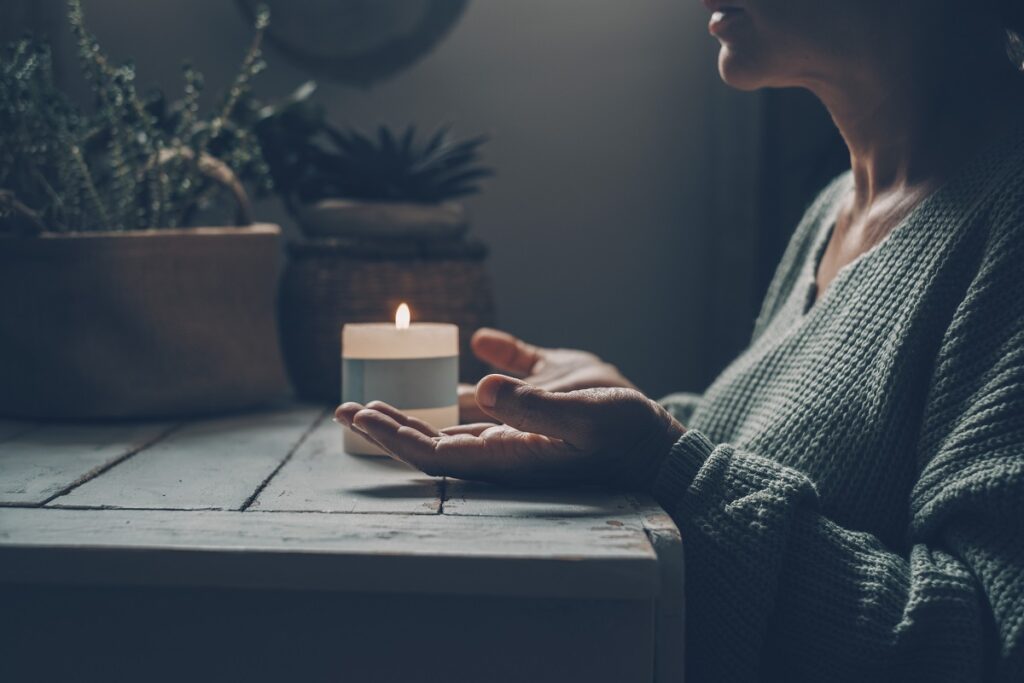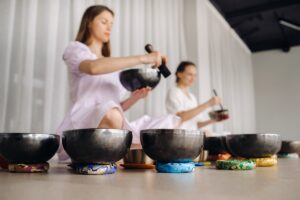American adults over 50 may be familiar with the frustration of lying awake at night, unable to fall or stay asleep. Stress, worry, medicine, and chronic pain all induce insomnia, which can lower your quality of life by making you weary and angry.
Did you know you may enhance your sleep naturally without medication? Meditation may help insomniacs relax, decrease tension, and sleep better.
For years, I tried sleeping drugs and homeopathic cures for insomnia. I solved my sleep problems with meditation. I meditate daily and sleep well.
Loving-kindness meditation, body scan meditation, progressive muscle relaxation, and mantra meditation can improve sleep. We’ll describe each strategy, how it works, and at least one research showing its efficacy.
These techniques can help you relax, release tension, and sleep better, whether you’ve meditated before or not. Try them! We’ll start with body scan meditation first.

Body Scan Meditation
Body scan meditation may help insomniacs sleep naturally. This meditation has been demonstrated to improve sleep and mental and physical wellness by deliberately concentrating on various regions of the body.
Body scan meditation increased sleep quality and decreased insomnia in older persons, according to a 2016 Journal of Holistic Nursing research. 49 55-year-olds were randomly allocated to a body scan meditation or control group. The meditation group performed body scan meditation for 30 minutes a day, six days a week, for eight weeks. The control group did not meditate.
The meditation group had better sleep quality and less insomnia than the control group after eight weeks. Daytime weariness and mood improved. If you’re an older adult with insomnia or other sleep disorders, body scan meditation may assist.
Body scan meditation is easy to conduct at home. Choose a peaceful area to lay down or sit, shut your eyes, and start focusing on your body from your toes to your head. Relax and release tension while you concentrate on each region of your body.
Body scan meditation may enhance sleep, tension, and relaxation with frequent practice. Why not try? It may be the natural solution you need to promote sleep and well-being.
Loving-Kindness Meditation
Loving-kindness meditation may help insomniacs sleep naturally. Meditation that focuses on love, kindness, and compassion for yourself and others has been proved to improve sleep and mental and physical health.
Loving-kindness meditation substantially enhanced sleep quality and decreased insomnia symptoms in older persons in a 2015 Journal of Psychosomatic Research research. 49 55-year-olds were randomly allocated to a loving-kindness meditation or control group. The meditation group completed 30 minutes of loving-kindness meditation six days a week for eight weeks, whereas the control group did not.
The meditation group had better sleep quality and less insomnia than the control group after eight weeks. Daytime weariness and mood improved. If you’re an older adult with insomnia or other sleep disorders, loving-kindness meditation may assist.
Loving compassion Home meditation is easy. Choose a quiet, comfortable location to sit, shut your eyes, and concentrate on love, kindness, and compassion for yourself and others. “May I be joyful, quiet, and sleep well” might direct your meditation. Imagine distributing love and compassion into the globe by repeating these lines.
Loving-kindness meditation may enhance sleep, decrease stress, and increase compassion with daily practice. Why not try? It may be the natural solution you need to promote sleep and well-being.
Progressive Muscle Relaxation
Tensing and relaxing muscle areas to relieve tension and promote relaxation has been demonstrated to improve mental and physical health, including sleep.
Progressive muscular relaxation enhanced sleep quality and decreased insomnia in older individuals in a 2012 Journal of Sleep Research research. 50 60-year-olds were randomly allocated to a progressive muscular relaxation or control group. The relaxation group exercised progressive muscle relaxation for 30 minutes, six days a week, for eight weeks, whereas the control group did not.
The relaxation group had better sleep and less sleeplessness than the control group after eight weeks. Daytime weariness and mood improved. These findings imply that gradual muscular relaxation may enhance sleep in older persons, which is good news for insomniacs.
Progressive muscle relaxation is easy to conduct at home. Start by lying down or sitting in a quiet spot and tensing and relaxing your muscles from your feet to your head. Tense each muscle group for a few seconds before relaxing.
Progressive muscle relaxation reduces stress, anxiety, and insomnia when practiced regularly. Why not try? It may be the natural solution you need to promote sleep and well-being.

Guided Imagery
Guided imagery enhanced sleep quality and decreased insomnia in older persons, according to a 2012 Journal of Gerontological Nursing research. 33 60-year-olds were randomly allocated to a guided imagery or control group. The guided imagery group listened to an audio recording for 30 minutes, six days a week, for four weeks, whereas the control group did not relax.
Guided imagery participants had improved sleep quality and less insomnia than the control group after four weeks. They reported decreased anxiety, sadness, and better quality of life. These findings imply that guided visualization may enhance older persons’ sleep, which is good news for insomniacs.
Guided imagery is easy to use at home. Choose a quiet area to sleep down or sit and listen to a guided imagery audio CD to visualize a tranquil and relaxing setting. Try to lose yourself in the situation and forget your troubles while listening.
Guided visualization may relieve stress, anxiety, and insomnia with consistent practice. Why not try? It may be the natural solution you need to promote sleep and well-being.
According to a 2012 Journal of Gerontological Nursing research, guided visualization improves sleep quality and reduces insomnia in older persons. Visualizing serene images might decrease stress and improve sleep.
Mantra Meditation
Mantra meditation may help insomniacs sleep naturally. Mantra meditation, which includes repeating a word or phrase to relax and concentrate, offers several mental and physical health advantages, including improved sleep.
Mantra meditation improved sleep quality and reduced insomnia in older adults in a 2011 Journal of Sleep Research study. 49 60-year-olds were randomly assigned to a mantra meditation or control group. The meditation group practiced mantra meditation for 20 minutes twice a day for eight weeks, while the control group did not relax.
The meditation group had better sleep quality and less insomnia than the control group after eight weeks. They reported decreased anxiety, sadness, and better quality of life. Mantra meditation may enhance older persons’ sleep, which is good news for insomniacs.
Mantra meditation is easy to practise at home. Choose a quiet area to sit and pick a mantra to repeat. Focus on the sound and rhythm of your mantra and let go of distracting thoughts and worries.
Mantra meditation can relieve stress, anxiety, and insomnia with regular practice. Why not try? It may be the natural solution you need to promote sleep and well-being.
According to a 2011 Journal of Sleep Research study, mantra meditation improves sleep quality and reduces insomnia in older adults. Mantras help you relax and focus, improving sleep.
Your Takeaway
Finally, we hope this blog article gave you some helpful meditation tips to enhance your sleep. These approaches might help you relax, decrease stress, and sleep better. Insomnia can be annoying and exhausting.
Meditation requires patience and consistency. Regular practice improves sleep and well-being over time.
Meditation has improved my sleep, happiness, vitality, and health – otherwise I wouldn’t recommend it! Try these methods and see what works for you.
Loving-kindness, body scan, progressive muscle relaxation, and mantra meditation all have distinct advantages and may be done at home.
Start meditating now for improved sleep! Sleep is vital to your physical, mental, and emotional wellness. Meditation may help you sleep better and wake up rejuvenated.
See also: 5 Morning Routine Habits That Keep You Mindful All Day









